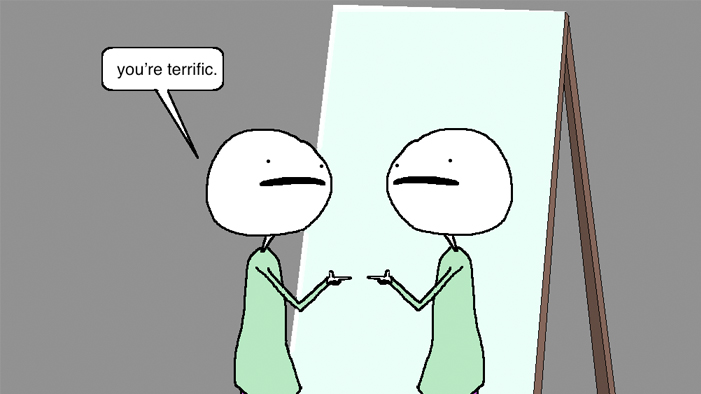Auntie SparkNotes: I’m Paranoid About My Friendships

Hola Auntie,
I’ve been having what some would call paranoia. I always shoot second glances at my friends, wondering, do they hate me? I think it’s because I’ve been tricked into thinking someone is a friend when they are really not. I don’t want it to happen again, but I can’t help feeling sick of myself for being suspicious of friends that I’ve had for 3 years. The “friend” I had before that “betrayed” me left our school, but I’m scared that it’ll happen again. Also, I’ve heard people call me annoying, and it REALLY hurts.
Should I stop being paranoid? I don’t want to get hurt again, but it disgusts me to think that I cannot do something as easy as trusting a person or being able to read their feelings. What should I do? Sometimes I feel like crying because I’m so lost. Also, some of my friends hang out in small groups, and they ignore me sometimes when I pass by, like in the hallway. I only know of three friends that I trust with my life, and that feeling sucks. I always tell myself and my family that I would never change myself for someone, but now I’m having second thoughts. I think, maybe they might hate me for being too loud. For being too talkative. For seeming to be boastful and a showoff. It really hurts to think that they would hate me, but I can’t seem to stop. What would you do in my situation? How should I react? Am I being too paranoid?
Um, yes?
And thus concludes our latest installment of Auntie SparkNotes States the Obvious—because I’m sure you don’t need me to tell you that it’s neither productive nor healthy to exist in a state of constant worry that all your friends secretly loathe you.
What’s less obvious, though, is this: being ruled by this kind of paranoia isn’t just unproductive, but counterproductive—because the more you obsess over being liked, the more uninteresting and unlikeable you’re bound to become. The worst thing about insecurity is how easily it can turn you into the most self-absorbed person on earth. And on that note, Sparkler, I’d like you to look back at your letter, and then ask yourself when you last cared about anyone else’s feelings except to wonder how they feel about you.
Because in all your fixation on whether people truly like you, it kinda seems like you’ve forgotten how to think about anything else—including how it must make your friends feel to be treated like their sole purpose within the parameters of your relationship is to reassure you that you’re okay as you are. You’re so worried about whether you can trust anyone, but are you trustworthy yourself? Are you honest, loyal, reliable, giving, and curious about other people’s lives—or are you suspicious, closed off, grasping, and wary? Do you engage with your friends in a way that makes them feel interesting, appreciated, and seen? Or do you hoard your energy and affection out of fear that they won’t be returned in kind?
These are honest questions to which only you know the answer. And if the answer is that you’re entirely confident that you’ve been a kind, generous, and sympathetic friend, then hey, that’s fine. But your letter suggests otherwise, and more importantly, it suggests that you’re very, very close to a revelation about how your fear of being unlovable is causing you to act in self-sabotaging ways. It paints a picture of a person who is so, so scared that she’s unworthy —and who is putting on a desperate performance of confidence to make up for it. “I’ll never change for anyone!” that girl says. “Just look at my many talents, look at all I have achieved! I’m terrific just as I am!”
And then she looks around the room with pleading eyes, and hopes that someone, anyone, will agree with her.
This, if I had to guess, is why you fear that other people think you’re a loud, boastful showoff who takes up all the air in the room: because privately, that’s what you think of yourself. You know your “I won’t change for nobody!” act is all just empty bluster in search of validation.
So, what should you do? For starters, you should stop trying to drown out your insecurities with loud declarations of self-esteem, which is not working at all and only making you feel worse about yourself. But for finishers, I’d like to gently suggest that you take a long and intentional break from worrying what other people think of you. The key to rewarding and fulfilling relationships is not to be yourself at people; it’s to be yourself with them. Take an interest in your friends. Ask them how they’re doing, what they’re up to, what they think about this or that thing. And if you have something to contribute, then do! But do it in the spirit of sharing, of deepening the conversation—in other words, in the spirit of friendship.
Because once you’re treating your friends with respect and consideration, instead of like an audience who has to validate your you-ness with applause, your relationships will transform accordingly—including your relationship with yourself. And though it may take time and effort, eventually, you will learn by doing to just be who you are, without feeling the need to defend or perform, and with the confidence to let other people take it or leave it.
Got something to say? Tell us in the comments! And to get advice from Auntie, email her at advice@sparknotes.com.
Want more info about how this column works? Check out the Auntie SparkNotes FAQ.












